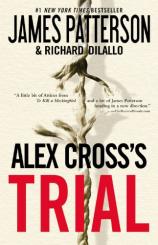Alex Cross’s Trial
Review
Alex Cross’s Trial
ALEX CROSS’S TRIAL is not, strictly speaking, a part of
James Patterson’s Alex Cross canon. Instead, it is presented
by Patterson and co-author Richard DiLallo as a memoir written by
Cross for his children based upon third-party journals and family
oral histories concerning the trials and tribulations of Abraham
Cross, a great-uncle of Alex’s, and Ben Corbett. It is an
interesting concept and, for those of a certain age, a
revelation.
TRIAL is set in the Deep South of the early 1900s. Corbett is a
Spanish-American war veteran and an idealistic attorney who has
garnered a national reputation for taking on tough cases involving
civil rights issues. He is recruited by his former superior officer
(and now president) Theodore Roosevelt to undertake what amounts to
an undercover mission in Eudora to determine the truth behind
race-related hangings throughout the Deep South. In places such as
Corbett’s hometown of Eudora, Mississippi, black people are
being lynched, and Roosevelt wants Corbett to get to the bottom of
it. Corbett’s contact in Eudora is to be Abraham Cross, an
elderly and principled resident of The Corners, Eudora’s de
facto black section. Cross is a witness to the hangings, and
Roosevelt’s actions are in direct response to Cross’s
pleas for assistance as well as newspaper accounts of the
incidents.
Corbett, notwithstanding the fact that the assignment is putting
a strain on his already groaning marital relationship, journeys
back to Eudora. His return, so far as anyone knows, is for the
purpose of interviewing candidates for a Federal judgeship, and he
is initially welcomed by old friends and acquaintances, most
notably Elizabeth Begley, Corbett’s first love. But the same
cannot be said of Corbett’s father, a cold and distant man
whose demeanor belies his powerful position as the town judge. When
the real purpose of Corbett’s return home gradually becomes
known, however, he is greeted with growing hostility by many of his
former friends. And when Corbett confirms for Roosevelt that the
rumors of brutal hangings in the area are true, it sets off a
firestorm that culminates in a criminal trial, which not only
attracts national attention but also serves as a harbinger of
things to come.
While TRIAL takes place in a fictitious place (Eudora,
Mississippi is just across the Tennessee-Mississippi border from
Memphis and not near Louisiana as it is described in the novel),
the events are based upon actual occurrences that took place
sporadically in the early 1960s. Thankfully, the world has moved on
since this dire time; black state highway patrolmen issue speeding
tickets on Mississippi highways --- of which I have firsthand
knowledge --- and minorities are well represented in local
government and the media. TRIAL, however, graphically describes
another time, and what might be accurately called another place.
Although not a true successor to the series, it is a haunting
account of a bleak time in America’s history. And for those
who are waiting for a new book featuring Alex Cross rather than one
that is ostensibly by him, never fear --- you can embark on the
next Cross adventure in November.
Reviewed by Joe Hartlaub on December 22, 2010
Alex Cross’s Trial
- Publication Date: April 6, 2010
- Genres: Fiction, Historical Fiction
- Paperback: 416 pages
- Publisher: Grand Central Publishing
- ISBN-10: 0446561800
- ISBN-13: 9780446561808





